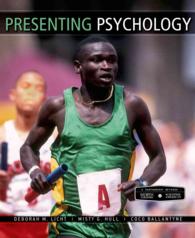基本説明
Aims to give comprehensive and updated coverage of theory, research and practice in two of the most challenging issues in today's English language teaching scenarios: the development of L2 vocabulary knowledge and the contribution of new corpus-based evidence to language teaching.
Full Description
This volume brings together current research and practical innovations in the field of foreign language teaching. The contributions are all by well-known experts in the area. More specifically, the volume aims to give some comprehensive and updated coverage of theory, research and practice in two of the most challenging issues in today's English language teaching scenarios: the development of L2 vocabulary knowledge and the contribution of new corpus-based evidence to language teaching. The first section of the volume presents a comprehensive overview of relevant issues in the field of L2 vocabulary acquisition, where surveys of the state of the art in the area combine with empirical studies which approach the topic from the field of applied linguistics (teaching techniques, material writing), as well as from complementary disciplines such as semantics, phraseology and lexicography. The second section of the book delves into the pedagogical applications of current research in the field of corpus-based studies. The papers collected here explore the potential of new corpus evidence for the development of foreign language learners' competence.
The final section bridges the gap between theory and practice by bringing together an intensely practical collection of papers offering useful advice on how to deal with vocabulary and/or corpora in the foreign language classroom that are derived from teaching and research conducted at the University of Granada (Spain) under the acronym ADELEX (Assessing and Developing Lexis through New Technologies). Though some papers involve reference to other languages such as French and Spanish, this is essentially a study of corpus and lexical theory as applied to contemporary English. The volume is backed up by an independent, dedicated website maintained by the editors. While web-based activities and vocabulary tests complement the printed material for the entire volume, Section 3 From theory to practiceA", provides systematic support.
Contents
Preface Fernando Serrano Valverde Introduction Maria Moreno Jaen, Fernando Serrano Valverde and Maria Calzada Perez SECTION I. Second Language Vocabulary Teaching 1. Analysing vocabulary teaching techniques Paul Nation (LALS, Victoria University of Wellington, New Zealand) 2. Fluency and spoken English Steven Kirk (Toyo University, Japan) and Ronald Carter (University of Nottingham, United Kingdom) 3. Phrase-noticing or phrase-learning: A question of semantics? June Eyckmans (Erasmushogeschool Brussel and Vrije Universiteit Brussel, Belgium) 4. Coming face to face with N1 P N1 sequences in Spanish Christopher S. Butler (Swansea University, Huddersfield University, and Centre for Translation Studies, University of Leeds, United Kingdom) 5. Missing words: The vocabulary of BBC Spanish courses for adults Paul M. Meara (University of Swansea, Wales, United Kingdom) and Jesus Suarez Garcia (Barnard College, New York, USA) 6. Connectors in EFL learners' essays and in course books Rosa M. Jimenez Catalan (University of La Rioja, Spain) and Julieta Ojeda Alba (University of La Rioja, Spain) 7. The treatment of lexical collocations in EFL textbooks Christian Abello-Contesse (University of Seville, Spain) and M. Dolores Lopez-Jimenez (Pablo de Olavide University, Spain) 8. Access routes to lexical collocations in English learners' dictionaries on CD-ROM Alfonso Rizo-Rodriguez (University of Jaen, Spain) SECTION II. Applying New Corpus-Based Evidence in Language Pedagogy 9. Learning outcomes from corpus consultation Alex Boulton (CRAPEL-ATILF/CNRS, Nancy University, France) 10. Combining text-based and corpus-based approaches in the learning and teaching of academic writing in French Angela Chambers (University of Limerick, Ireland) 11. The death of the adverb revisited: Attested uses of adverbs in native and non-native comparable corpora of spoken English Pascual Perez-Paredes (University of Murcia, Spain) 12. A web-as-multimodal corpus approach to lexical studies based on intercultural and scalar principles Anthony Baldry (University of Messina, Italy) 13. Learning from Obama and Clinton: Using individuals' corpora in the language classroom Maria Calzada Perez (University Jaume I, Spain) SECTION III. ADELEX: From Theory to Practice. 14. 'Very' in predicate adjective constructions: A contrastive (English-Spanish) discourse-functional approach towards its pedagogical implementation Judith A. Carini Martinez (University of Almeria, Spain) 15. Developing university learners' collocational competence: An empirical corpus-based investigation Maria Moreno Jaen (University of Granada, Spain) 16. Exploring conversational grammar through films in the ELT classroom: A corpus-based approach M. Elena Rodriguez Martin (University of Granada, Spain) 17. The use of DVD films as multimodal texts to raise contextual awareness in the acquisition of polite words in English: The case of 'please' N. Ignacio Lopez Sako (University of Granada, Spain) 18 ADELEX CAT: A computer adaptive test for the lexical evaluation of university students M. Teresa Lopez-Mezquita Molina (University of Granada, Spain) Appendix








